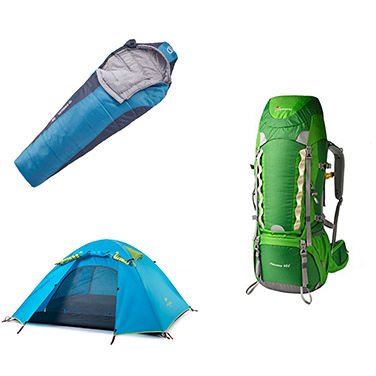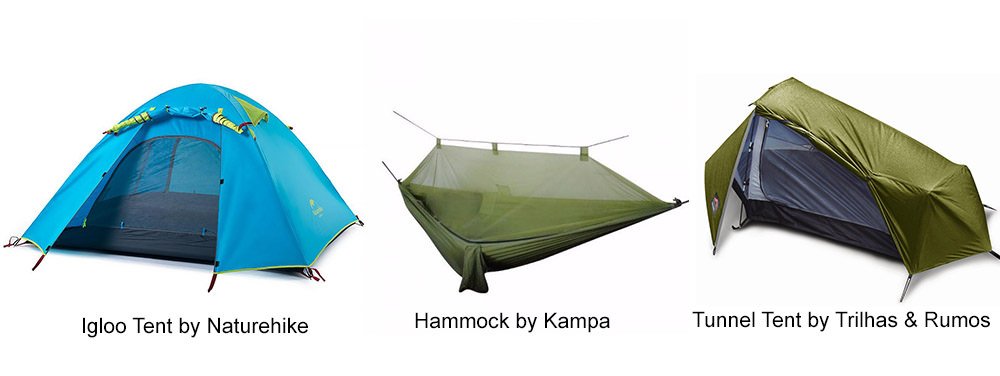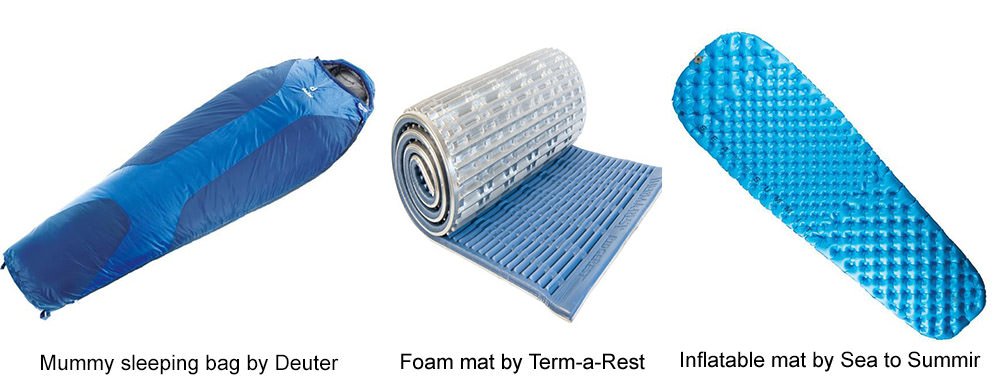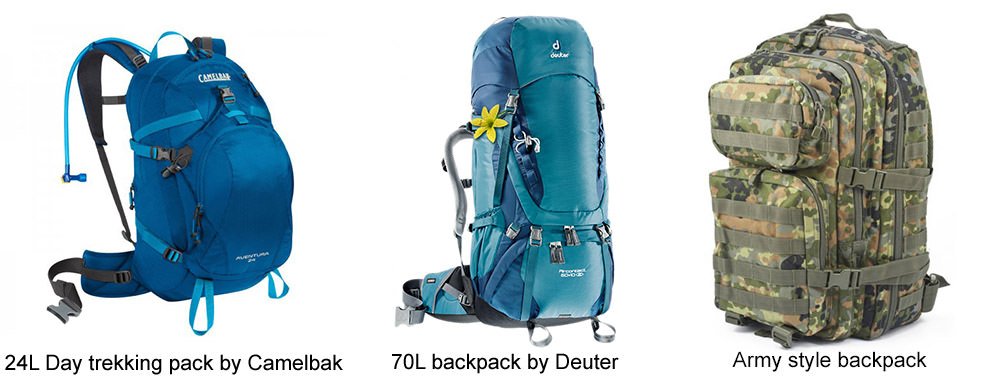Gooood evening from Brazil. In this post I'd like to talk about my 3 essentials to go camping.

Going camping or exploring new trails, be it far away or near your house, is a stress relief activity. It's always relaxing to sleep in the woods, go up a montain to see the sunset or have fun with your friends during the summer near a lake.
Until things go wrong, you get wet from the rain because your tent failed, your backpack starts hurting your back with the weight or the strap snaps, you get cold and unable to sleep during the night because you had the wrong sleeping bag. After this failed situations on their first camping experience many people give away and don't come back, when the truth is, they didn't have the right equipment.
When I first started I didn't have the top stuff around available, nor I had the money to buy it, but through research I was able to find the essentials to start. It took me many trails and even a 10.000 km hitchhiking trip to adapt and feel that I needed to change some things, get better quality or lower my equipment weight. What I want to say is that you don't need to spend a lot to start, personal requirement will come with time, however you should pay attention to have a good base to enjoy the outdoors.

The items I want to talk about are the first in a list of any beginners and are called "THE BIG 3". The 3 most important items to start, and also the first 3 you will want to look for better options in the future if you started on a budget. They are:
- Shelter
- Sleeping System
- Backpack.
Apart from all the other essencials and gadgets, the big 3 are by far the biggest, heaviest and most expensive items you'll have to buy when starting out and are also the ones that will give you confort and security while outside.
The best feelings after a day of walking is eating, enjoying a fire and going to sleep, you'll be tired wishing for a well rested night to renew your energies for the next day. To provide that you'll need a good tent to keep insects and, most importantly, a sudden rain out, you'll want a cozy platform to sleep on and a nice cover to keep you warm.
Let's not get into the details of each item since this subject can extend to a much more complex and controverse discution. I want to give you an overview to start from.
SHELTER
This will provide you protection from the elements and can divide into different subcategories.
- Tent, this is the classic option for most of us. Tents can come in many different shapes - the most famous is the iglu-, sizes, weights, rain protection. My advice here is to not go cheap, even if you only plan to camp for the weekend, avoid tents sold in supermarkets, they will not provide rain and wind protection. Every serious tent brand will provide you with the tent's waterprof rating, it's measured in millimiters and will give you and idea of how much rain it can hold. For exemple in Brazil during the rain season it's advisable to have at least 1500 mm of rain protection, the more the better. Your tent size should meet the number of people that are going to sleep in it, I usually recomend taking one number higher for extra confort, for example, if there are going to sleep 2 people, take a tent for 3, if you are going alone a single person tent will do it. Your budget is the limit for tents. try to grab one that is not extremely heavy and bulky, remember that the lighter your tent the more fragile and expensive it will be.
- Hammock/Tarp, a lot of people are migrating from tents to hammocks and tarp to save weight, this is a great option if you know there are going to be trees to set your hammock, otherwise you'll have to find a solution. It's generally lighter than a regular tent but does not provide the same confort and space to throw all your gear in.
- Bivak, this is by far the most hardcore sleeping option, it consists of sleeping without any protection isolating you from the nature, maybe just a tarp to protect from the rain. It's also the lightest and easiest to setup since you just need to throw your sleeping mat on the ground and sleep, simple. I have tried bivak on many occasions and it's a great connection with the nature, but I only did that when I knew it was not going to rain, otherwise I'd set my tent.

SLEEPING SYSTEM
What I call sleeping system consists on your 'bed'. It'll be a platform to sleep on and something to cover and maintain body warmth.
- Sleeping mat, they are your bed, it's where you are going to sleep on. They have mainly 2 functions. First and most important is to isolate you from the ground, that means, your sleeping mat will not let your body heat transfer to the ground, and belieave me, once you wake up cold it'll be very difficult to go back to sleep. Second and also important your sleeping mat will provide you confort, they are never going to be like your spring matress but may get close. Sleeping mats can divide into 3 groups (foam, autoinflatable and inflatable). The most common are the foam mats, they are cheap, very light and isolates very well from the groud, the cons are that they are not that confortable. I'll get into details in a post dedicated to this subject.
- Sleeping Bag, this is a survival item if you are going to really cold places. Sleeping bags are the most common way to keep you warm during the night when camping. The most classic type is the syntetic mummy bag, they have a zipper to close it around you from your feet to your head. Again, don't go super cheap on this item, pay attention to its warmth rating, every serious brand should give you 3 ratings (confort, limit and extreme). My advice here is to check the lower temperature you'll encounter and make it 5ºC worse, with that number, let's say 0ºc, look for a sleeping bag with that confort zone. I'll come back to this subject in a new post to a more in depth explanation.

BACKPACK
Least, but also important. A backpack is the traveller's best friend, it'll carry all the stuff and support all the abuse without saying a word.
A good backpack should be confortable and give you the ability to adjust the straps to your body dimensions. There are different types of backpacks for each situation but the most important aspects you have to pay attention are:
- Volume, backpacks are divided by volume in liters. This is very difficult for beginners to decide which size is the best for their use and there isn't an answear for that. It depends on what you want to carry, so my advice woud be to gather everything you absolutely need and buy a backpack accordingly. Don't go for the biggest ones, the bigger the backpack the more unimportant stuff you'll shove in there to make it full, it's a trap. A good starting size is around 50-70 liters.
- Size, this is very important. You have to choose a backpack according to your body size, that's why I don't recomend buying on the internet. Go to a camping store and try on a bunch of different backpacks and ask the vendors to help you out measuring your torso length to check if you choice serves. Once you have the right size and all the straps are adjusted to your body size you should have no back problems in the future.
- Construction, you can go from super light weight backpacks all the way to bullet proof army packs. I like to recommend for starters a good aluminium internal frame backpack, they are the most common ones and can be found at good budgets. Stay away from army packs, they are cheap and not that confortable. Remember here, a super light weight pack will not carry heavy equipment but a heavier pack will carry everything. If you feel you need a lighter pack, let experience tell you that.

As I said earlier camping gear can extend to a much much bigger discussion, all I wanted here was to give an overview for those who would like to start living outdoor. I wish I had this simple topic when I started, that would've saved me a lot of money.
I plan on expanding this topic in a more in depth examination, but that's it for now.
Remember, don't let the lack of money keep you from enjoying the outdoor life, go with what you have, maximize your equipment use and let experience tell you if you need to upgrade.
Hope you guys enjoyed, stay tunned for more tips and if you like this post please leave a comment below, that means a lot and helps me keep motivated.
Obs.: All images were generated using free sources and edited by @mrprofessor

